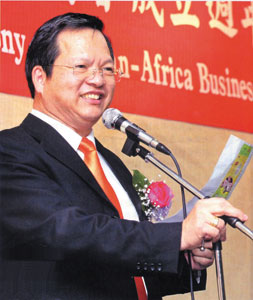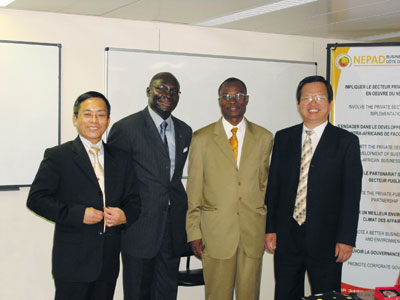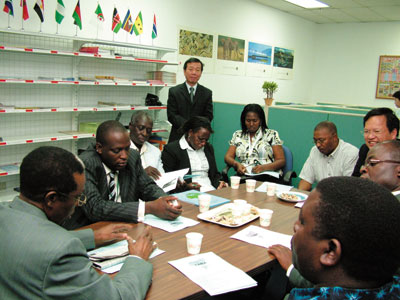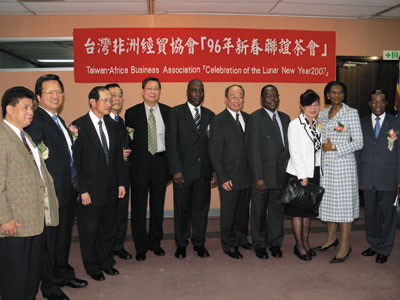TABA Chairman Promotes Taiwan-Africa Trade and Proposes Parts Data Center
2008/08/25 | By Quincy LiangAs the founder and first chairman of Taiwan-Africa Business Association (TABA), Eden Chou, also general manager of QQQ Industrial Corp., a very experienced and major auto-parts trading company established in 1980, has a very clear goal to enhance trade between Taiwan and Africa, a long-neglected market brimming with business opportunities.
Chou, who has been eagerly cultivating Taiwan-Africa interaction long before TABA's establishment, is totally convinced that Africa will be a major trade partner for Taiwan.
"Long ago, most companies in Taiwan ignored the importance of Africa as a business partner due mainly to insufficient knowledge, as well as worrying about personal and business safety," Chou says based on his extensive experience in successfully building stable, lucrative business ties with Africa. "Many years ago for the rest of the world Africa seemed a minor market despite possessing rich natural resources, which could not be transported easily due to lacking infrastructure and political factors. But with surging fuel and commodity prices, businesspeople can find more opportunities the earlier they enter Africa, which has become an increasingly important location. The same reason drives us to invest in China."

"Taiwan companies, however, without official backing like counterparts in China, have to adopt another strategy to tap the African market," Chou continues. "Last year TABA successfully led three Taiwan trade delegations to different African nations, achieving initial success to build business ties. But, I have been telling Taiwan firms eagerly interested in Africa that the most effective way for Taiwan players is to find suitable partners there, and then educate them in business concepts. In short, we should look at Africa with the view to cultivate the potential market, seeking to achieve mutual-success rather than only selling products for short-term business relationship."
According to the TABA chairman, setting up TABA is to help Taiwan companies interested in Africa to take full advantage of the association's platform to exchange information and share experiences gained from business activities in Africa. "TABA looks forward to integrating resources available from related government agencies and private sectors to more effectively explore business opportunities in Africa," Chou says.
Also TABA's other function is to promote and improve trade and investment relations between Taiwan and African nations, as well as educate the Taiwan business community that Africa is an emerging, attractive business destination.
So far over 80 members from various industries have joined TABA.
Holding Multiple Events
TABA holds many activities to exert its function, Chou says, including organizing trade and investment missions to Africa, holding African-market related seminars in partnership with relevant government agencies and business associations, and holding the TABA monthly forum to enhance inter-member exchanges. The chairman welcomes anyone with business experience or knowledge of Africa to cooperate with or join TABA, believing the input and growing membership will help the association to further cultivate trade between Taiwan and Africa.
TABA just successfully led a big Taiwan delegation to four African nations from August 23 to September 8, including Cote d'Ivoire, Ghana, Nigeria and Tanzania, with the group consisting of 20 major companies in Taiwan that visited the capitals of the four nations, including Abidjan (Cote d'Ivoire), Accra (Ghana), Lagos (Nigeria), Salaam (Tanzania).
The delegation included Aten International Co, Ltd. (major products as KVM switches, VGA splitter/switch etc.), Beverly and Victor Co., Ltd. (chemicals, appliances etc.) Candeo Corp. (computers peripherals etc.), Carrot Industrial Co., Ltd. (blinds, roller shades etc.), Formosa 21 Inc. (CCTV products, computer peripherals), Froch Enterprise Co., Ltd. (stainless steel welded pipe and tube), Giantlock Co., Ltd. (cable ties and wire accessories), Glacialtech Inc. (CPU cooler, chassis fan etc.), QQQ Industrial Corp. (auto spare parts and accessories) etc.


As both the TABA chairman and general manager of a major auto-parts trader, Chou proposes setting up an auto-parts data center in Taiwan to greatly upgrade the island's global competitiveness.
According to Chou, the auto-parts data center should be backed by relevant government agencies, trade-promotion organizations, and trade associations, but run independently to collect information on various makes and models, including production and sales volumes, parts numbers etc.; as well as serve the local auto-parts industry in terms of product development planning.
Currently, almost all local aftermarket (AM) auto-parts makers in Taiwan work independently and develop products mainly according to customers' requirements, Chou explains. Local suppliers often cannot tap small volume orders, often the rule than exception in the AM parts business, due to lacking economy-of-scale.
"The core competitiveness of Taiwan's auto-parts industry is its ability to fill small-batch, large-variety orders," Chou says, "but individual makers lack sufficient data on various makes and models, so they end up accepting such orders by chance. I hope all interested parties will support setting up the auto-parts data center in Taiwan, which will collect and provide wide ranging data to help makers plan production and marketing strategies."
Longest Product Life
"The auto-parts business is one of few industries with such long product life," Chou says. "Taiwan is the strongest supplier in the collision-parts (ones replaced after collisions such as auto lamps, body parts, radiators, mirrors etc.) sector, in especially industrially advanced nations as the United States, while rivals stand little chance to catch up with players in Taiwan, regardless of the newcomer's financial clout, because the segment requires long-term investment in die and mold development."
For non-body AM replacement parts, Chou continues, the largest market is small-volume demands worldwide for various makes. Such is true especially in third-world and developing nations, where cars are often used imports, which often can continue to work with not new body parts but critical parts for the drive-line for example.
Many spare-parts makers or traders in Taiwan receive numerous few-piece orders, Chou says, which must be refused for nobody is going to invest in tooling to build a few pieces. Such scenario is untrue, however, for high-mileage cars, of which over 50,000 still may be running worldwide. This presents globally unlimited business opportunities to make an item for a collective group of customers, and the unit price would be very attractive due to the small volume of each order.

The proposed auto-parts data center will bring new hope for the auto-parts industry in Taiwan, Chou says, because it can be a key bridge between parts makers on the island and buyers worldwide. A good example is when a foreign customer asks the center to find a maker of specific parts; the center then can find data on the existing ownership volume of such make globally, which will help a maker to decide on the feasibility of the order and plan production and marketing accordingly.
Another of the center's significant function is to help local parts makers minimize overlapping development work that not only wastes resources but also causes reckless underselling competition, the chairman adds. More importantly, the center can also help achieve integrated competitiveness in the local auto-parts line to compete against rivals in China, who focus on big-volume production but might shift to small-volume business when they change operational model.
Last but not least, Chou says, the data center would also simplify the complexity of doing auto-parts business, as well as help recruit more young, talented professionals to join the line in Taiwan to achieve sustainable development. (August 2008)




